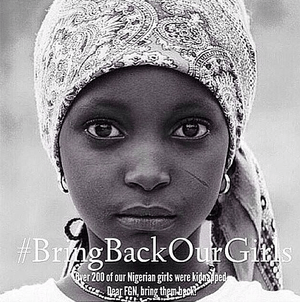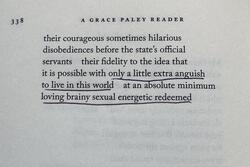More than a Hashtag: Nigerian Girls, Social Media, and Bruriah
#BringBackOurGirls became an enormously popular hashtag on Twitter, and this image was shared across Facebook in the days after nearly 300 girls were kidnapped in Nigeria. The text on the image reads:
#BringBackOurGirls
Over 200 of our Nigerian girls were kidnapped.
Dear FGN [Federal Government of Nigeria], bring them back!
As a feminist activist and Internet junkie, I get most of my news from online, feminist-leaning news sources. Consequently, I learned about the plight of the 300 kidnapped girls in Nigeria before the general public became aware of it. I was dismayed that it took so long for mainstream news sites to cover the incident, and I am equally saddened by its quick disappearance from people’s thoughts. Although major news sites are still reporting on the situation, such updates are largely absent from social media. A couple days ago, my Facebook newsfeed was exploding with event pages, shared articles, and updated statuses about the kidnapped girls. Now, I hear nothing.
I suppose it’s not surprising that conversations about the kidnapping have stopped; once articles about an issue no longer appear in people’s feeds, they forget about it just as quickly as they retweeted it. However, just because citizens of the Internet have mostly ceased to talk about the kidnapped girls does not mean that they’ve been brought home. They are still suffering, still in captivity, still separated from their parents and loved ones.
It would be a shonda for the world of social media to completely forget about this. People in positions of power will only exert effort on behalf of the kidnapped girls if they know that the public cares about them. Consequently, those who have social media presences, no matter how small, should try to keep Internet discourse about the situation in Nigeria alive. It is part of our legacy as Jews and Jewish women to do as much as we can to help the cause, as demonstrated by one of our feminist forebears: Bruriah.
Although Bruriah is best known as one of the few women named in the Talmud as a scholar, Tractate Avodah Zara 18a shares a fascinating story about her and her (unnamed) sister. When their father was killed as one of the Ten Martyrs, Bruriah’s sister was kidnapped and taken to a brothel. Upset about her sister’s plight, Bruriah sent her husband, the scholar Meir Ba’al HaNes, to rescue her. Although this was a highly risky task, he traveled to Rome and located his sister-in-law. When the brothel guard refused to accept his bribes for fear that his overseer would kill him for losing a prostitute, R’ Meir sweetened the deal by teaching him a verse that would invoke God’s protection: eloka d’Meir aneni – God of Meir, answer me. This form of payment prompted the guard to look the other way as Meir and his sister-in-law escaped the brothel.
It is imperative that we emulate Bruriah and Meir Ba’al HaNes and help save our kidnapped sisters in Nigeria through social media. Even though Facebook is no longer blowing up with information about the girls, we must keep conversation about them alive and continue to post about them on every social media platform that we frequent. Through our status updates, tweets, and reblogs, we ask the God of Meir (and Bruriah) to answer us.







I donÌ¢âÂã¢t have a gazillion readers, but hereÌ¢âÂã¢s a link, for what itÌ¢âÂã¢s worth.